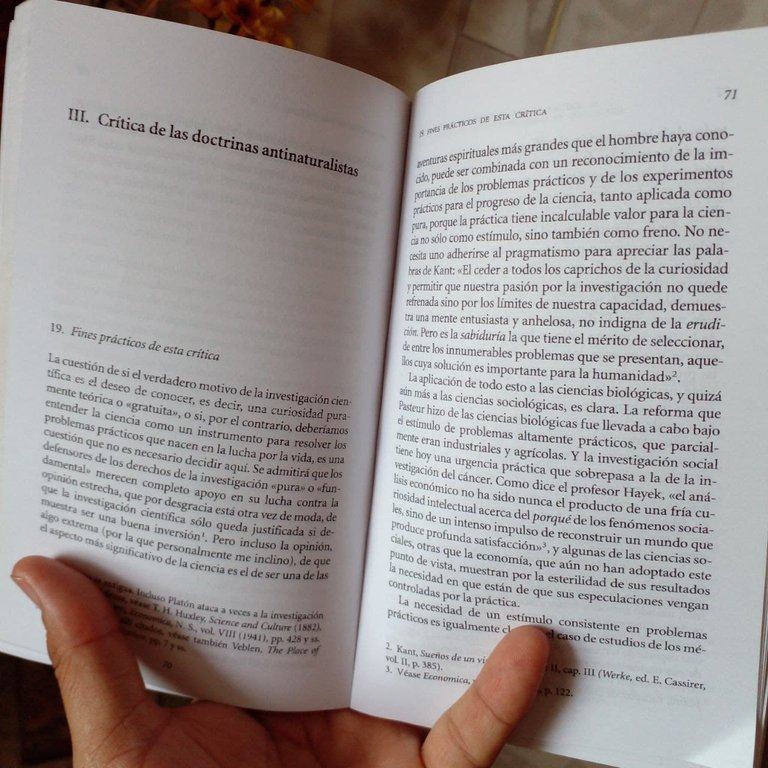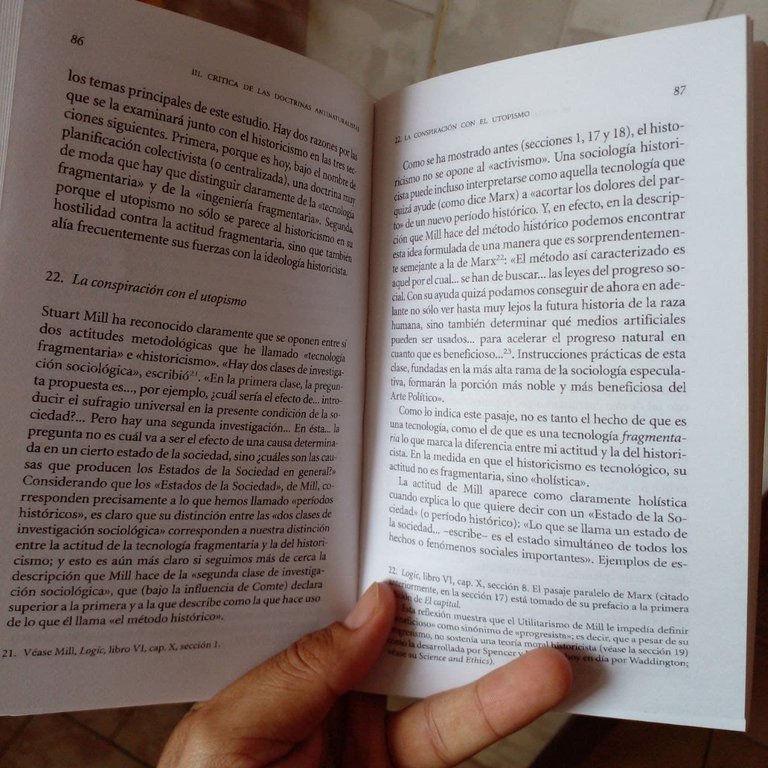Reading The Misery of Historicism by Karl R. Popper [ENG-ESP Leyendo La Miseria del Historicismo de Karl R. Popper
VERSION EN ESPAÑOL
Hola amigos amantes de los libros
Bienvenidos
Hoy les vengo a platicar sobre un texto que poseo desde hace años, pero no fue sino hasta hace poco que lo comencé a leer, no lo he terminado aun, pero no podía esperar más para hablarles de este texto llamado "La miseria del Historicismo" del Filósofo Karl R. Popper.

Un libro de tipo ensayo, muy breve en realidad no llega a las 200 páginas, pero no debe ser juzgado por su brevedad ya que posee ideas profundas e interesantes, se puede pensar que por su corta extensión puede ser leído de manera rápida, bueno de poder se puede, pero de hacer una lectura rápida te quedas en la superficie cuando en realidad el texto invita a una profundidad bastante interesante. Por eso me he tardado más de lo que pensé.
Interesante para quienes nos importan tantos las ciencias naturales como las ciencias sociales, ya que en este libro el autor enfoca su atención en la relación que puede existir entre estas disciplinas, en resumen, Karl Popper lo que intenta es esbozar una audaz crítica a la influencia de la historia humana por el crecimiento del conocimiento.
Aunque parezca una obviedad, es evidente que la historia humana deba estar influencia por el desarrollo del conocimiento y muchos otros desarrollos humanos, ya que hablamos de la historia humana. Pero lo que hace valioso el texto es lo implícito en la obviedad, hemos caído en la aplicación de las leyes de las ciencias naturales en el ámbito social, cuando en realidad son lugares donde el estudio y el conocimiento se dan de manera diferente.

Lo que me dejó claro el autor con la lectura de "La miseria del historicismo" lo erróneo que es pensar que el porvenir, la evolución humana puede ser objeto de predicción a través de modelos, leyes o ritos que aparentemente gobiernan el orden social.
Karl Popper me dejó claro que somos completamente inútiles al momento de predecir nuestro futuro a partir de la historia. Mirar atrás, descubrir patrones en los hechos no nos sirven de mucho al momento de determinar nuestro porvenir.
Uno de los ejemplos que se me ocurrió a partir de la lectura fue en relación a la bolsa de valores y el mercado Bursátil. Imaginemos que se hace una predicción de cierta acción en los próximos 7 días, se dice que aumentará su valor al punto de doblar su valor actual en los próximos 7 días, antes de tener un terrible desplome.

Los corredores, comprarán esta acción haciendo que ella suba de valor, quizás hasta doble su valor, pero justo antes del 7mo día todos venderán las acciones haciendo que tenga un desplome en su valor de manera apresurada. Esto es un hecho inminentemente aislado y no responde a un profundo análisis de la historia, que esto haya ocurrido no significará que ocurrirá de nuevo.
Ahora bien, mi tarea es terminar el texto, pero me dejó algo muy claro no podemos predecir el futuro del modo que lo hemos venido haciendo de manera tradicional. Las leyes de las ciencias naturales no aplican en el ámbito social de manera perfecta.

Nuestra historia está llena de novedad ya que nada puede repetirse del mismo modo y de la misma manera.
Gracias por leer



ENGLISH VERSION
Hello friends book lovers
Welcome
Today I come to tell you about a text that I have owned for years, but it was not until recently that I started to read it, I have not finished it yet, but I could not wait any longer to tell you about this text called "The Misery of Historicism" by the philosopher Karl R. Popper.

An essay type book, very brief in fact it does not reach 200 pages, but it should not be judged by its brevity because it has deep and interesting ideas, you may think that because of its short length it can be read quickly, well it can be, but if you do a quick reading you stay on the surface when in fact the text invites you to a quite interesting depth. That's why it took me longer than I thought.
Interesting for those of us who care as much about the natural sciences as the social sciences, since in this book the author focuses his attention on the relationship that may exist between these disciplines, in short, Karl Popper's attempt is to outline a bold critique of the influence of human history on the growth of knowledge.
Although it may seem obvious, it is evident that human history must be influenced by the development of knowledge and many other human developments, since we are talking about human history. But what makes the text valuable is what is implicit in the obviousness, we have fallen into the application of the laws of the natural sciences in the social sphere, when in fact they are places where study and knowledge occur in a different way.

What the author made clear to me with the reading of "The Misery of Historicism" is how wrong it is to think that the future, the human evolution can be predicted through models, laws or rites that apparently govern the social order.
Karl Popper made it clear to me that we are completely useless at predicting our future from history. Looking back, discovering patterns in events is of little use to us in determining our future.
One of the examples that occurred to me from the reading was in relation to the stock market and the stock market. Let's imagine that a prediction is made for a certain stock in the next 7 days, it is said that it will increase in value to the point of doubling its current value in the next 7 days, before having a terrible crash.

Brokers will buy this stock causing it to rise in value, perhaps even double in value, but just before the 7th day they will all sell the stock causing it to plummet in value in a hurry. This is an imminently isolated event and does not respond to a deep analysis of history, just because it happened does not mean it will happen again.
Now, my task is to finish the text, but it made something very clear to me: we cannot predict the future the way we have been doing it in the traditional way. The laws of the natural sciences do not apply perfectly in the social realm.

Our history is full of a novelty since nothing can repeat itself in the same way and in the same manner.
Thank you for reading


Saludos @filoriologo, es una reflexión interesante, que no podemos predecir nuestro futuro con certeza, debido a las casi infinitas decisiones individuales que cada uno toma. Y allí no podemos aplicar matemática, estadística, ni ninguna ciencia natural porque no aplicaría a lo social.
Me recuerda al pensamiento de Friedrich Von Hayek, quien estaba en contra de los planificadores centrales en los gobiernos, quienes quierían hacer ingeniería social desde el Estado. Hayek abogaba por el libre mercado y libre interacción de los individuos por encima de una planificación central decidida por unos pocos.
Totalmente de acuerdo con Von Hayek, creo que la verdadera libertad no es escoger los platos disponibles en un menú que ha sido preelavorado por unos pocos (Chef y dueño del establecimiento), sino que la verdadera libertad es que yo pueda escoger que plato deba existir en el menú.
Your content has been voted as a part of Encouragement program. Keep up the good work!
Use Ecency daily to boost your growth on platform!
Support Ecency
Vote for Proposal
Delegate HP and earn more
@tipu curate
Upvoted 👌 (Mana: 0/92) Liquid rewards.